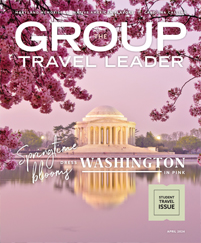
Rome remains a popular international destination, courtesy Globus
Step Three: Decide Whether To Use a Tour Operator
Using a tour operator is highly recommended for a group leader planning an international trip for the first time. The benefits of having experts take care of all the details can save a lot of foreign-travel headaches.
“Safety is the No. 1 concern for any group leader,” said Dale. “So pairing yourself with a tour operator who can help you with unexpected incidents is important. Whether it is Mother Nature acting out or civil unrest, having the peace of mind that your customers are safe and secure with professionals who know the intricacies of the country is important.”
Tour operators research destinations thoroughly and often pair up with local guides to make sure the trip runs smoothly. With this amount of expertise, you don’t have to be the conduit for the trip, just the conduit of the group. Even if you don’t speak a word of Chinese, a tour operator will make sure that a fluent tour director stays with you to prevent any language mishaps.
“With a tour operator like us, group leaders can go to a country with a difficult language, like China, and not give it another thought,” said Halboth. “They can go to a place they have never been before and just enjoy the group dynamic. The tour director and local guides will take care of the rest.”
When you travel with a tour operator, a customer crisis that would normally fall to you, such as a lost piece of luggage, is handled by the tour director instead.
If you decide against a tour operator, make sure you partner with some local tourism guides or experts to ensure your preparedness to send your group to a foreign country.
Step Four: Find Out the Basic Information
Once you have chosen the location and tour operator, figure out all the basic information your group members will need to travel. Be ready for your group to ask you questions on currency exchange rates, international phone plans, what charge adapters they’ll need, if vaccinations are required and if the country requires any entry fees.
Most important, do not forget to ask whether the traveler has an updated passport valid three months beyond the return trip.
“It’s a simple thing, but you have to ask the passport question,” said Halboth. “If you travel domestically a lot, sometimes it does not cross your clients’ minds. Ask early, so they don’t have to pay rush fees. It is still shocking to find out how many Americans don’t have passports.”
Tell your group members to leave copies of their passport and itineraries with a family member or a close friend in case of any emergencies. They should also give a copy of their passport to you or the tour operator during the trip, in case of lost or stolen passports.
The other major concern before you leave is insurance. Explain to your travelers the importance of both trip and international health insurance. The one time someone in your group needs their policy’s coverage will be enough of a reason to recommend or require insurance.
“I highly recommend everyone get insurance, especially if it is an older group,” said Halboth. “You are planning these international groups so far out that you have no idea what will happen between now and then. It takes the stress out. Our insurance is all in one package, which is useful.”
Make sure that the tour operator offers insurance on the trip before you sign up. For example, all USTOA members are required to participate in a $1 million traveler insurance program that protects travelers in the unlikely event that the tour operator company should declare bankruptcy.










